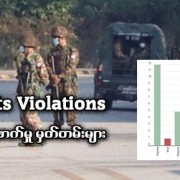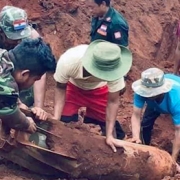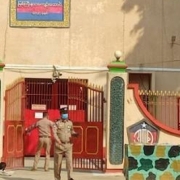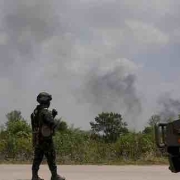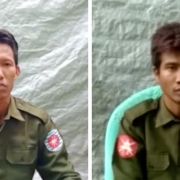Military withholds bodies of two tortured, slain Muslim civilians from relatives in Sagaing Region
Junta troops threw the young detainees’ remains into the Mu River river after denying requests from the victims’ families to retrieve them for a proper burial
The military refused to return the bodies of a 28-year-old man and a 17-year-old boy killed in junta custody to their bereaved relatives in Kanbalu Township, Sagaing Region, this week.
The bodies of Thet Paing Soe, the elder victim, and Chit Min Naing, a minor, were found in a nearby drainage ditch on Friday with injuries suggesting torture. They had been detained and interrogated along with six other civilians in the town of Zee Kone two weeks earlier.
Soldiers stationed at the town’s sugar mill—accompanied by local police—arrested the eight civilians between March 8 and 9, after a woman who was allegedly working for the military as an informant was shot dead in the municipal market on March 6 by unknown assailants.
Another woman, who had been working at the market at the time, claimed she did not know who had shot the woman or for what reasons.
The detainees—including vendors and other locals—were held at the sugar mill. One was released on March 10 and five others were released on March 16.
“The bodies [of Thet Paing Soe and Chit Min Naing] were found in the U Aung Zay Ya ditch, stuck at the water gates just outside Zee Kone,” a local man told Myanmar Now on the condition of anonymity. “They were already badly disfigured when we found them.”
Citing eyewitnesses, he said that Thet Paing Soe had what appeared to be knife wounds to his chest and deep cuts all over his body. The body of Chit Min Naing had similar cuts, and his face showed signs—including bulging eyes and a protruding tongue—which suggested that he had been hanged.
They estimated that the victims had been dead for at least five days at the time they were found.
Thet Paing Soe had been arrested on March 8 along with one other man, who, like him, was a member of Zee Kone’s large Muslim community. After five more people, including Chit Min Naing’s mother—also a Muslim—were arrested on March 9, Chit Min Naing had gone to the police on March 10 to surrender himself to the officers in an attempt to secure her release.
“The military took his mother when he wasn’t home, so he turned himself in the next day in exchange for her release. Five vendors, including his mother, were released soon afterwards but they were already physically and mentally traumatised. The mother is losing her mind now after her son’s death,” the local man said.
Thet Paing Soe ran a mobile phone repair shop near the market where the alleged military informant was killed, and Chit Min Naing had worked for him there. However, neither had any known connections to the death of the alleged informant.
“Both of them were just civilians and they hadn’t done anything suspicious. They simply worked in a phone shop and were killed for no reason at all,” the local man said.
A source close to the victims’ families said the military refused their request to retrieve the bodies from the ditch for a proper Muslim burial, instead throwing them in the Mu River.
Thet Paing Soe, the owner of the phone shop, had gotten married 10 months earlier and is survived by his wife, who is five months pregnant with their child.
The local man who spoke with Myanmar Now—also a Muslim resident of Zee Kone—said that he had begun to feel a deep hatred towards the military council, which had not only killed two innocent civilians but even refused to return the victims’ bodies to their families.
“It’s so insulting that they invalidated their existence and religion even in death. I’d understand if they’d been killed during interrogation. But this was purely an execution and it breaks my heart to see the families deprived of the right to give their loved ones a proper funeral,” he said.
According to friends of the victims’ families, the military had also forbidden them from holding vigils, inviting neighbours to their houses to mourn, or even publicly praying.
“It’s really scary for us because we’re a minority here, especially during the first days of Ramadan,” the local man added, referring to the holy month which began on the evening of March 22. “Almost all of the past violence [against Muslims] took place during this month, so everyone is on edge these days.”
After the military disposed of the victims’ bodies in the Mu River, they were found downstream in Khin-U Township on Saturday. A group of local youth gave them a burial on the shore.
Detainees of the junta have been subjected to extrajudicial killings by the military and their allies in the neighbouring Mandalay Region in recent months, including in Natogyi, Madaya, and Myingyan townships late last year.
Myanmar Now attempted to contact the military council’s information department regarding the arrest and killing of the two youths but received no response.


